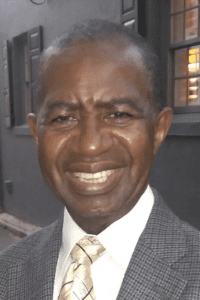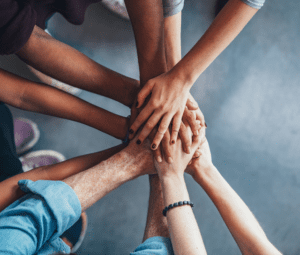
For the benefits of human genetics and genomics research to be realized by all people, research studies must reflect humanity’s diversity. This will take a concerted effort by the research community and greater engagement with individuals and communities underrepresented in research. Policymakers play a pivotal role in shaping the landscape of genetic research, healthcare, and public policy, and ASHG communicates with Congress and others to share how human genetics and genomics research advances knowledge and creates hope. Human genetics and genomics has a profound impact on individuals, families, and communities. By showcasing these narratives, ASHG seeks to honor those who participate in genetic research and highlight the real-world implications of scientific inquiry.
In Our DNA SC is a community health research project established by a study team at the Medical University of South Carolina. It aims to enroll 100,000 participants via no-cost genetic testing to build a database representative of South Carolina’s diverse population. This research program seeks to empower individuals to better understand their genetic risk for certain cancers and heart disease, promote more equitable access to genetic healthcare, and improve personalized medicine approaches. The Messenger recently spoke with Lee H. Moultrie II, a native South Carolinian, retired U.S. Air Force Veteran, and a nine-year prostate cancer survivor, about his participation in the In Our DNA SC research program and how the research has impacted him and his family.
What led you to participate in the In Our DNA SC research study?

Lee H. Moultrie II: As a 67-year-old African American and a prostate cancer survivor, I’ve been familiar with DNA studies for years prior to participating in this project at the Medical University of South Carolina. As a civil rights activist and healthcare advocate, I became even more excited to see that I could participate in a project of this nature for free and be engaged in something that was bigger than myself and could impact our community and society for many years to come. And possibly, even playing a small part in advancing healthcare for many within my family, community, and society as a whole. I can also become aware of different genetic cancer risks that were previously unknown to me.
How has your participation in research impacted you and your family?
LHM: I am thoroughly excited each day knowing that I’m a part of the positive change that I want to see within our community and within our society. I am even more excited to inform others about the opportunity to join a research project like this at no cost. So often I hear individuals say they don’t get a chance to participate in research projects or don’t have a seat at the table. I fiercely advocate for identifying opportunities to participate in research and bringing them to the attention of individuals from all ethnic backgrounds, allowing everyone the chance to participate in research.
It will be interesting to learn of any potential risks to my health based upon the results of my DNA analysis. This information can also guide me on potential lifestyle adjustments, such as dietary changes or activities, to potentially prevent or delay the onset of any diseases. I have both children and grandchildren, and the insights gleaned from this research study could serve as valuable knowledge to share with them, enhancing their awareness of potential genetic predispositions.
What has been the positive outcome of your participation in the In Our DNA SC program?
LHM: One positive outcome was a new opportunity to communicate with others about the benefits of participating in genetic research. I wrote an Op-Ed in the local newspaper asking our local community, and especially the African American community, to help fight medical injustice of the past by volunteering in research for our future. One young lady googled my name and called to express her excitement about the article. Additionally, a tenured African American studies professor from the local college sent me an email articulating his satisfaction in what I articulated within the article.
Another positive outcome was more information. I met with a genetic counselor to discuss the outcomes of the study and how I can make more informed decisions about my health. Furthermore, I frequently share information about engaging in research studies like this one with other men who are also prostate cancer survivors. Given that DNA carries significant health insights, my aim is to equip others with the knowledge to enable informed choices. For example, my barber asked me for information on how to participate in the study himself and to leave flyers in the barber shop for other individuals.
How do you see your role as an advocate for human genetics & genomics research?
LHM: I would like to see myself as a strong advocate for others to become more involved in a project of this nature. I aim to build partnerships, so I welcome anyone to reach out to me with questions. If needed, I can also connect them with someone more knowledgeable about the project. I want to see myself as a regular guy and a resource within the community. I also like to remind people that there are five different generations in the workplace with different perspectives.
This is the next level of personalizing my health care, enabling me to strive towards reaching the age of 100 or beyond, guided by insights gleaned from the feedback provided by genetic counselors! It is also critical for researchers to receive the necessary funding to push the boundaries of scientific knowledge and lead research endeavors at the forefront of their fields. Researchers help people at all ages, including Members of Congress, their communities, and future generations.
What would you want a researcher who studies genetics to know about what research means to you?
LHM: I am enthusiastic about researchers undertaking such a project for our society, where individuals of all ethnic backgrounds and genders can participate if they wish. Importantly, we are trusting researchers to safeguard and respect our DNA, adhering strictly to the terms of our agreement regarding its use for scientific purposes and ensuring it is not commodified or sold.
Also, a question to pose to researchers – how can we better work together to get the message out so that more people can come to the table and participate in research? It is important for more people to participate in studies and let their voices be heard. I want my legacy to be a part of that – passing on information and empowering other people.

In your opinion, how can trust be built between scientists and research participants moving forward?
LHM: Being an African American retired U.S. Air Force Veteran for the past 30 years and now working in the healthcare arena for the past 24 years, trust should be a key element to all our relationships.
I truly believe that we can trust everyone until they prove differently. Starting a trusted relationship is looking for common ground and fostering that – be it through sports, food, or science. We are looking for more of a relationship than a transaction. After establishing a relationship, we can move into a partnership or a collaboration. Within the medical community and especially within the research community, there are many checks and balances to protect us participants in research to help make sure that the mistakes of the past are not repeated. In her recent book, Legacy: A Black Physician Reckons With Racism In Medicine, Dr. Uché Blackstock shares a path forward for the research and medical community: actions speak louder than words.
Finally, this is why it’s important for individuals of all ethnic backgrounds to be at the table to participate in research projects like this. Building trusted relationships so that researchers and communities can work as collaborative partners is essential. Additionally, the involvement of community elders is invaluable both to share knowledge and to make a path for the next generation as we prepare to pass the baton to them on life’s journey.
Special thanks to Lee H. Moultrie II, healthcare advocate and community activist, for his participation in this interview and for the wonderful conversation. Thanks also to ASHG Government and Public Advocacy Committee member Paula Ramos, PhD, Associate Professor at the Medical University of South Carolina, who helped to facilitate this connection.
